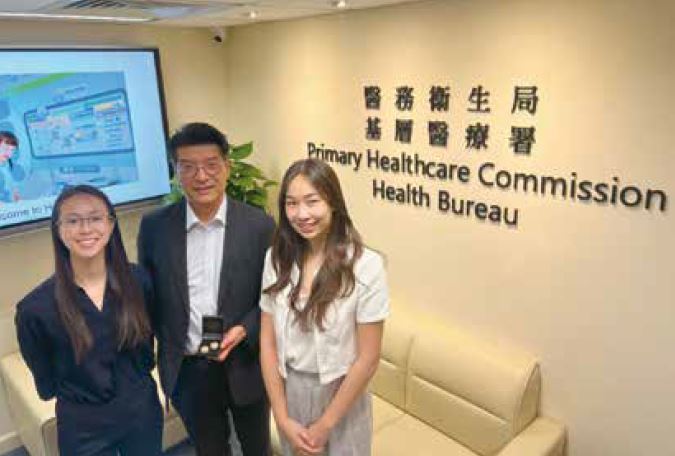© Hong Kong Academy of Medicine. CC BY-NC-ND 4.0
HEALTHCARE FOR SOCIETY
Redesigning healthcare: an
interview with Dr Fei-chau Pang
Bethany Choi, Hei-yue Ng
Year 3, The University of Hong Kong, Hong Kong SAR, China
Dr Fei-chau Pang is the Commissioner of Primary
Healthcare at the Health Bureau in the Hong Kong SAR Government. He
is the current President of the Hong Kong College of
Community Medicine and was a Clinical Associate
Professor at the School of Public Health of The
University of Hong Kong until 2022.
As we began our interview with a question
about his past achievements, Dr Pang humbly
redirected the conversation and said, ‘Let’s not focus
on achievements; let’s chat more about Hong Kong’s
primary healthcare system instead’. Throughout the
interview, his passion for improving our healthcare
system through system-level changes was evident,
reflecting the drive that has persisted throughout his
career.
This conversation raised important questions
about our primary care system, such as, ‘What
committed role should primary care doctors take in
Hong Kong?’ and ‘How effective is our healthcare
system in improving the general health of our
population?’ Our dialogue with Dr Pang prompted
deep reflection on the importance of developing
strong primary healthcare in Hong Kong and how
we, as a community of healthcare professionals,
can collectively improve the accessibility and
sustainability of our healthcare amid increasing
fiscal pressure and disease burden.
Dr Pang’s involvement in primary healthcare
began early in his life. During secondary school,
he volunteered as a student health leader for the
Department of Health, raising public awareness
about smoking cessation. His advocacy continued in medical school as a council member of the medical
society by organising community exhibitions for
cancer screening. As he pursued specialty training
in geriatrics, he developed a deeper appreciation
for providing holistic care for patients. These
experiences inspired him to further his training in
medical administration, which led him to pursue
various impactful projects over the years.
In 2004, Dr Pang was actively involved in
setting up Hong Kong’s first batch of public Chinese
medicine clinics, focusing on quality assurance
and information system development. This
initiative operated under a tripartite collaboration
model involving the Hospital Authority, a non-governmental
organisation, and a local university
to provide research-oriented care to the public. This
administrative model was an innovative approach at
the time, though was proven successful, with over
18 service centres in Hong Kong as of 2024. Later,
Dr Pang became the Chief Manager of the Hospital
Authority’s Quality and Safety Division, where he led
the hospital accreditation programme in both the
private and public sectors and successfully assisted
in the accreditation of five public hospitals by the
Australian Council on Healthcare Standards (ACHS).
The aim was to create a quality improvement system
for public hospitals and develop Hong Kong’s first
set of hospital standards based on the Evaluation
and Quality Improvement Program (EQuIP 4)
standards adopted in Australia. Dr Pang also led the
redevelopment project of the Grantham Hospital,
which involved the planning of the design, facilities,
and services. Subsequently, Dr Pang was transferred to the Head Office of the Hospital Authority and
spearheaded the development of the myHR App to
enable direct electronic communication with all staff
across over 40 hospitals.
When asked about his motivation for pursuing
systemic change, Dr Pang responded, ‘Often, it is
easy to go on with your day-to-day work without
making much effort in improving the current
workflow. However, is there indeed nothing we
can improve within our existing system? I find
purpose in identifying and addressing pressing
issues by building major, system-level changes in
our healthcare system. Though developing holistic
solutions involving multiple stakeholders is not
without challenges, my guiding principles in life
motivate and drive my work.’
Since 2022, having come full circle, Dr Pang
has combined his passion for community care and
administration in his new role as the Commissioner
for Primary Healthcare in the Health Bureau.
One major problem in Hong Kong’s healthcare
system is the lack of sustainability in its specialist-led
model. Many chronic diseases are managed
under the Hospital Authority with limited primary
care services and there is a reduction of focus on
disease prevention and a lack of continuous care.
As a result, patients with chronic diseases may not
be well-managed and present with complications
as their first encounter with the healthcare system.
For instance, many conditions being treated in the
hospital currently, such as myocardial infarction,
end-stage renal failure, and vision loss in adults, are
linked to modifiable risk factors, including poorly
managed hypertension and diabetes mellitus. This
healthcare model increases reliance on specialist
care and exacerbates waiting times for all.
Currently, healthcare expenditure accounts for approximately 19% of the government’s total
spending in 2024/25, and this figure is expected
to rise if the system remains unchanged. Such a
trajectory renders Hong Kong’s healthcare system
unsustainable. Recognising that the lack of emphasis
on primary healthcare is closely linked to issues
of accessibility, quality of care, and the overall
sustainability of the healthcare system, Dr Pang
is committed to supporting the government in
reforming Hong Kong’s primary healthcare system.
Dr Pang explained that the main reason for
these healthcare challenges stems from limited
public understanding of primary healthcare and
guidance of its role among healthcare workers. Many
patients seek care only when symptoms arise and
may be reluctant to undergo preventative screenings
suggested by doctors due to high cost and a lack of
understanding about their benefits. Some patients
might seek primary care at the emergency department
instead of primary care clinics, while others might
engage in ‘doctor shopping’. These behaviours hinder
the development of the continuous doctor–patient
relationship that is important for comprehensive
care.
In both primary healthcare and specialist
doctors, consultations often focus on the patient’s
chief complaint rather than the health of the
whole person. For instance, during a primary care
consultation for an upper respiratory tract infection,
the primary care doctors may not, in their routine
practice, advise on screenings for colorectal cancer
or chronic diseases like diabetes and hypertension.
On the other hand, specialists may only focus on
diseases related to their expertise and may not
think about referring patients to primary care for
long-term follow-up and management of chronic
diseases. These issues reflect just a few of the
‘hotspots’ in the current healthcare system, as noted
by Dr Pang. He emphasises the need for change, ‘We
need to promulgate and encourage our professionals
to take up new commitments on continuity of care
and responsibilities on chronic disease management,
especially in the private sector.’
To address the main challenges, Dr Pang,
as the Commissioner for Primary Healthcare, is
leading the Primary Healthcare Commission in
its implementation of the measures set out in the
Primary Healthcare Blueprint, which was unveiled in
the Chief Executive’s 2022 and 2024 policy addresses.
The team has spearheaded the development of
District Health Centres (DHCs) in all 18 districts,
which aim to develop a community-based
service network and serve as a pivotal hub
for primary healthcare services, providing health
promotion, health assessments, and chronic disease
management, whilst also bridging the gap with
secondary care through development of the eHealth
system.
Among the initiatives coordinated by the
DHCs is the Chronic Disease Co-Care Pilot Scheme.
This scheme provides subsidies for diagnosing and
managing hypertension and diabetes mellitus in the
private sector. It includes subsidised laboratory tests,
a specialised drug list at significantly discounted
prices, and multidisciplinary care. The DHCs assist
citizens in pairing with family doctors and provide
multidisciplinary support in managing patients.
They also empower people to manage their own
health by providing blood pressure monitoring,
weight management, and health promotion.
Another initiative is the development of the
Life Course Preventive Care Plan, which is a set of
guidelines for both public and primary healthcare
professionals on the recommended preventative
care measures based on an individual’s age and sex. It includes guidelines on immunisation, women’s
health, mental health support, cancer screening,
chronic disease management, and more. Ultimately,
this initiative hopes to better guide family doctors in
providing care to patients and improve the public’s
understanding of the role of primary care whenever
they encounter their family doctors.
Our conversation with Dr Pang encourages
us to be courageous in bringing about meaningful
changes, whether big or small, and he inspires us to
focus on what truly matters to us rather than seeking
validation from others. By the end of our interview,
despite Dr Pang’s modesty in acknowledging his
work as an accomplishment, it is undoubtedly
clear to us that he is passionate about reform and
hopes that it will have a substantial impact on our
society.

Dr Pang with Dr Libby Lee, the Under Secretary for Health promoting the Life Course Preventive Care Plan in primary healthcare


